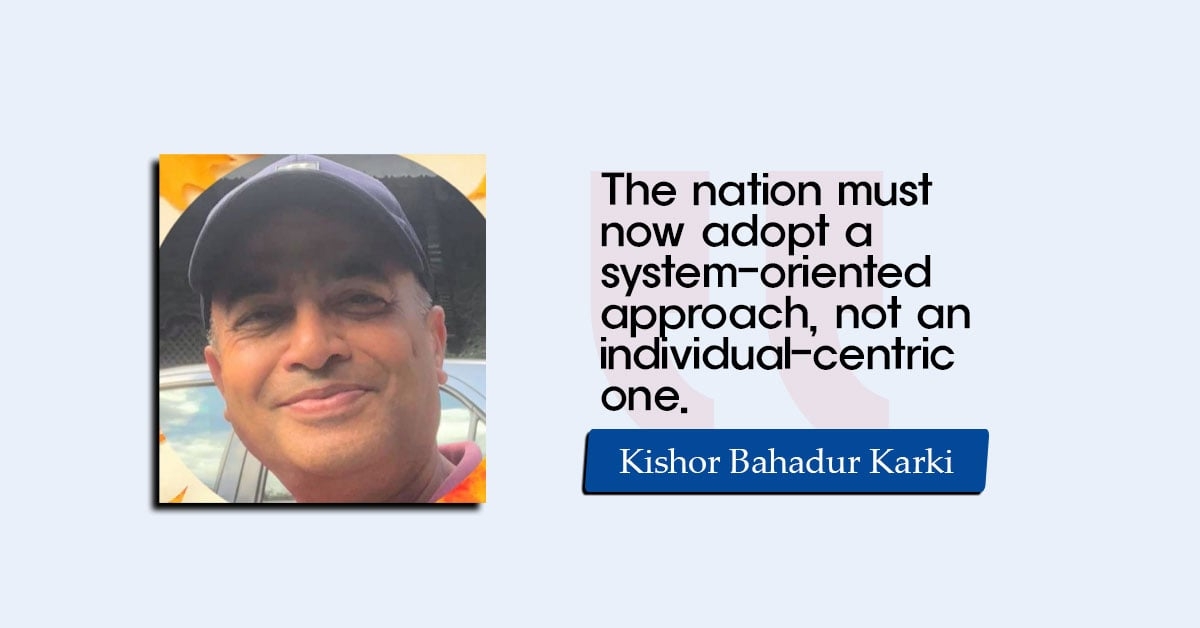

KATHMANDU: Nepal stands at a historical turning point. There have been many political changes, but systemic reform is still incomplete. Political slogans, ideologies, and alliances have changed, but the practice of governance is still centered on the individual, access, and recommendation.
As a result, even good and capable people can never rely on the system, and even honest employees are disappointed due to an environment where the individual is stronger than the system. It is for this reason that the pace of the country’s development is slow, the judicial process is weak, and citizen trust is declining.
The time has now come for the question to be, not ‘Whose government is it?’ but ‘What kind of system is it?’ The nation must enter an era where it is governed not by emotion, but by method and system. The government, administration, judiciary, and security mechanisms all need to be based on a well-organized and automated system, where any transfer, promotion, evaluation, or responsibility is automatically implemented according to the criteria of seniority, efficiency, and qualification.
If that system is implemented, no one’s recommendation, access, or improper gifts will be necessary. The country will automatically become corruption-free, because the system itself will become the police.
The problem that has been seen in Nepal for decades is the same: system is weak, emotion is strong. Decisions that give immediate satisfaction in the name of popularity are made, but decisions taken without deep investigation and preparation of method and procedure lead to long-term problems.
Even now, sometimes someone is caught in the name of popularity. But, when the method and law are not strong, the police administration and the court are forced to release the person the very next day. And that individual emerges even stronger.
When method is weak, the prestige of justice is hurt. If the method is strong, the corrupt will be caught themselves; no one’s command is needed. True governance is that which runs the system, not the individual. Establishing method and procedure takes patience and time, but that alone ensures stability and justice.
Method means an environment that allows the judicial, investigative, and administrative bodies to work independently without any pressure or interference. If that environment is not created, no policy will be permanent, and no government can make long-term improvements.
Reform is not possible without ending the culture of recommendation. We must now enact a policy revolution, where transfer, promotion, and evaluation are conducted through a completely transparent and automated system. At that time, everyone, from offices to ministries, from the police to the army, will be able to take pride in being qualified. Because, they will get justice even without any access, recommendation, or political proximity.
If the country runs on a system, people will fear acting arbitrarily. The unqualified will not get the post, and the qualified will never have to be deprived. That is the essence of good governance.
The movement raised by the Gen-Z generation today is not merely a demand for political change, it is a voice for systemic reform and the re-establishment of method and rule. The dream this generation has seen is for the country to become a nation of method, efficiency, and transparency, not of individuals and access. For that, the government, the judiciary, and the administration must all stand on the same thought: Method Above, Individual Below. That is the basis of a just, sustainable, and prosperous nation.
The nation must now adopt a system-oriented approach, not an individual-centric one. The nation must take the direction of binding all administrative and political mechanisms into an integrated, transparent, and accountable system. Only that system will make the public feel that the country is genuinely changing, not just in words, but in the system.
In this context, the government’s first priorities should be:
Only these steps will generate trust in the public, proving that the sacrifice of the Gen Z was not in vain. The country has now truly started to run on a system.
Nepal’s future is now vested in method, competence, and system, not emotion. The current government must show the historic courage to make the country run on a system, not on individuals. The concern of the country should now be, not ‘Who will do it,’ but ‘What kind of system will run it.’
This opinion points out the need to transform Nepal’s governance system from one based on individual access, recommendation, and nepotism to a system based on method, efficiency, and transparency.
Only when method is strong, the system is transparent, and justice is independent, can the country move forward on the path of stability, good governance, and economic prosperity.
(Karki is a social worker.)